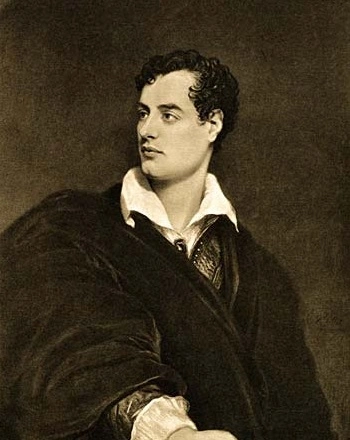Lord Byron: Childe Harold's Pilgrimage (Sprache & Litteratur).
Publié le 13/06/2013
Extrait du document

Lord Byron: Childe Harold's Pilgrimage (Sprache & Litteratur). Die epische Versdichtung Childe Harold's Pilgrimage (Junker Harolds Pilgerfahrt) machte den englischen Dichter Lord Byron bekannt und begründete seinen Ruhm als einen der herausragenden Vertreter der Romantik in der englischen Literatur. Das kühne Werk erschien in vier Teilen zwischen 1812 und 1818 und erzählt die Geschichte eines desillusionierten romantischen Helden, der sich in seinem Lebensüberdruss in Reiseabenteuer stürzt. Byron beginnt sein Epos mit einer Beschreibung der Unzufriedenheit des Protagonisten und fährt in der 14. Stanze mit einer Schilderung Portugals und Lissabons fort. Lord Byron: Childe Harold's Pilgrimage XIV. On, on the vessel flies, the land is gone, And winds are rude in Biscay's sleepless bay. Four days are sped, but with the fifth, anon, New shores descried make every bosom gay; And Cintra's mountain greets them on their way, And Tagus dashing onward to the Deep, His fabled golden tribute bent to pay; And soon on board the Lusian pilots leap, And steer 'twixt fertile shores where yet few rustics reap. XV. Oh, Christ! it is a goodly sight to see What Heaven hath done for this delicious land! What fruits of fragrance blush on every tree! What goodly prospects o'er the hills expand! But man would mar them with an impious hand: And when the Almighty lifts His fiercest scourge 'Gainst those who most transgress His high command, With treble vengeance will His hot shafts urge Gaul's locust host, and earth from fellest foemen purge. XVI. What beauties doth Lisboa first unfold! Her image floating on that noble tide, Which poets vainly pave with sands of gold, But now whereon a thousand keels did ride Of mighty strength, since Albion was allied, And the Lusians did her aid afford: A nation swoln with ignorance and pride. Who lick, yet loathe, the hand that waves the sword To save them from the wrath of Gaul's unsparing lord. XVII. But whoso entereth within this town, That, sheening far, celestial seems to be. Disconsolate will wander up and down, 'Mid many things unsightly to strange ee: For hut and palace show like filthily; The dingy denizens are reared in dirt; No personage of high or mean degree Doth care for cleanness of surtout or shirt. Though shent with Egypt's plague, unkempt, unwash'd, unhurt. XVIII. Poor, paltry slaves! yet born 'midst noblest scenes - Why, Nature, waste thy wonders on such men? Lo! Cintra's glorious Eden intervenes In variegated maze of mount and glen. Ah me! what hand can pencil guide, or pen. To follow half on which the eye dilates Through views more dazzling unto mortal ken Than those whereof such things the Bard relates. Who to the awe-struck world unlock'd Elysium's gates? Lord Byron: Childe Harold's Pilgrimage to Portugal. Lissabon 1919, S. 1f. Microsoft ® Encarta ® 2009. © 1993-2008 Microsoft Corporation. Alle Rechte vorbehalten.

«
Microsoft ® Encarta ® 2009. © 1993-2008 Microsoft Corporation.
Alle Rechte vorbehalten..
»
↓↓↓ APERÇU DU DOCUMENT ↓↓↓
Liens utiles
- Lord Byron (Sprache & Litteratur).
- Le personnage de HAROLD Childe de Byron
- Joseph Conrad: Lord Jim (Sprache & Litteratur).
- Lord BYRON: Le Chevalier Harold (Résumé & Analyse)
- Le personnage de MANFRED de George Gordon, lord Byron

































